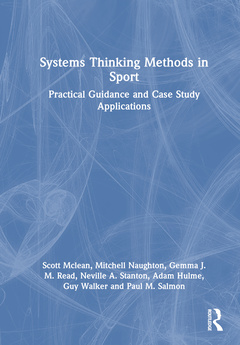Description
Systems Thinking Methods in Sport
Practical Guidance and Case Study Applications
Authors: Mclean Scott, Naughton Mitchell, Read Gemma, Stanton Neville A., Hulme Adam, Walker Guy, Salmon Paul
Language: English
160.25 €
Not Yet Published
Add to cart· 17.4x24.6 cm · Hardback
Description
/li>Contents
/li>Readership
/li>Biography
/li>
Sport is increasingly being described as a complex system. This inherent complexity cannot be understood by examining components in isolation, rather, the system as a whole should represent the unit of analysis. Systems thinking is the answer to understand this complexity. Systems thinking, is a fundamental approach for understanding complexity and is beginning to gain traction in sport. It provides a philosophy and a set of associated methods which can be used to understand and optimize the behavior of complex systems such as sport.
This book presents, for the first time, a practical guide to applying contemporary systems thinking methods in sport, as well as case study applications demonstrating how their outputs can be translated in practice. The methods described in this book can be used for better understanding the systemic influences on performance, injury, team functioning, decision making, adverse incidents, sports organization design and redesign, and prediction modelling.
Systems Thinking Methods in Sport provides a practical step by step guide for sports practitioners and stakeholders, as well as university students and academics in applying state-of-the-art systems thinking methods to sport.
Part 1: Introductory Chapters to Complexity and Systems Thinking Concepts
1. Introduction To Complexity and Systems Thinking in Sport
2. Where To Intervene in Sports Systems
Part 2: Systems Analysis Methods
3. Hierarchical Task Analysis (HTA)
4. Cognitive Work Analysis
5. The Event Analysis of Systemic Teamwork (East) and East Broken Links (East-Bl) Approach
6. Network Analysis
7. Causal Loop Diagrams
8. The Systems Theoretic Accident Model and Processes (STAMP) Control Structure Method
Part 3: Risk Analysis Methods
9. The Systems Theoretic Accident Model and Processes (STAMP) - Systems Theoretic Process Analysis (STPA) Method
10. The Networked Hazard Analysis and Risk Management System (Net-HARMS)
11. The Accident Mapping (AcciMap) Method
12. The Accident Network (AcciNet)
Part 4: Many Model Applications
13. A Many Models Approach to Complex Sport Systems Analysis and Design
Scott McLean is a Senior Research Fellow and the research theme leader for Sport and Outdoor Recreation in the Centre for Human Factor and Sociotechnical systems at the University of the Sunshine Coast. He holds a bachelor’s degree in sport and exercise science, a master’s degree in exercise physiology, and a PhD in Human Factors and Ergonomics in sport. Scott’s research spans a broad range of domains including sport science, safety science, systems thinking, and complexity science. He has strong collaborations in sport and has worked and conducted research with multiple national and international sporting organisation including, the World Anti-Doping Agency, Sport Integrity Australia, the Australian Institute of Sport, Athletics Australia, Cycling Australia, the French Anti-Doping Agency, Sport and Recreation Victoria, the English Institute of Sport, Scottish Rugby Union, the Defence Science & Technology Group, St Kilda AFL club, Brisbane Roar Football Club, Sunshine Coast Lightning netball, and UniSC Para Sport.
Mitchell Naughton Mitch Naughton is an Associate Lecturer in Exercise Physiology at the University of Newcastle (Australia). He has undergraduate and postgraduate degrees in sport and exercise science and completed his PhD at the University of the Sunshine Coast Centre for Human Factors and Sociotechnical Systems where he investigated the influence of external loads on post-match fatigue in collision sport athletes. He has over 10 years of applied and research experience in the areas of performance analysis, sports science, and exercise physiology. He has presented at leading international and national sports science conferences and maintains an active research profile with international collaborators across a range of domains including sport, physical activity, defence, and occupational settings.
Gemma Read is the Co-Director of the Centre for Human Factors and Sociotechnical Systems at the University of the Sunshi
These books may interest you

Complex Systems in Sport 184.47 €

Complex Systems in Sport 53.83 €

Complex Sport Analytics 160.25 €

